2020年初中英语中考语法二轮专项复习(15)现在完成时知识点整理总结(含练习与解析)
文档属性
| 名称 | 2020年初中英语中考语法二轮专项复习(15)现在完成时知识点整理总结(含练习与解析) | 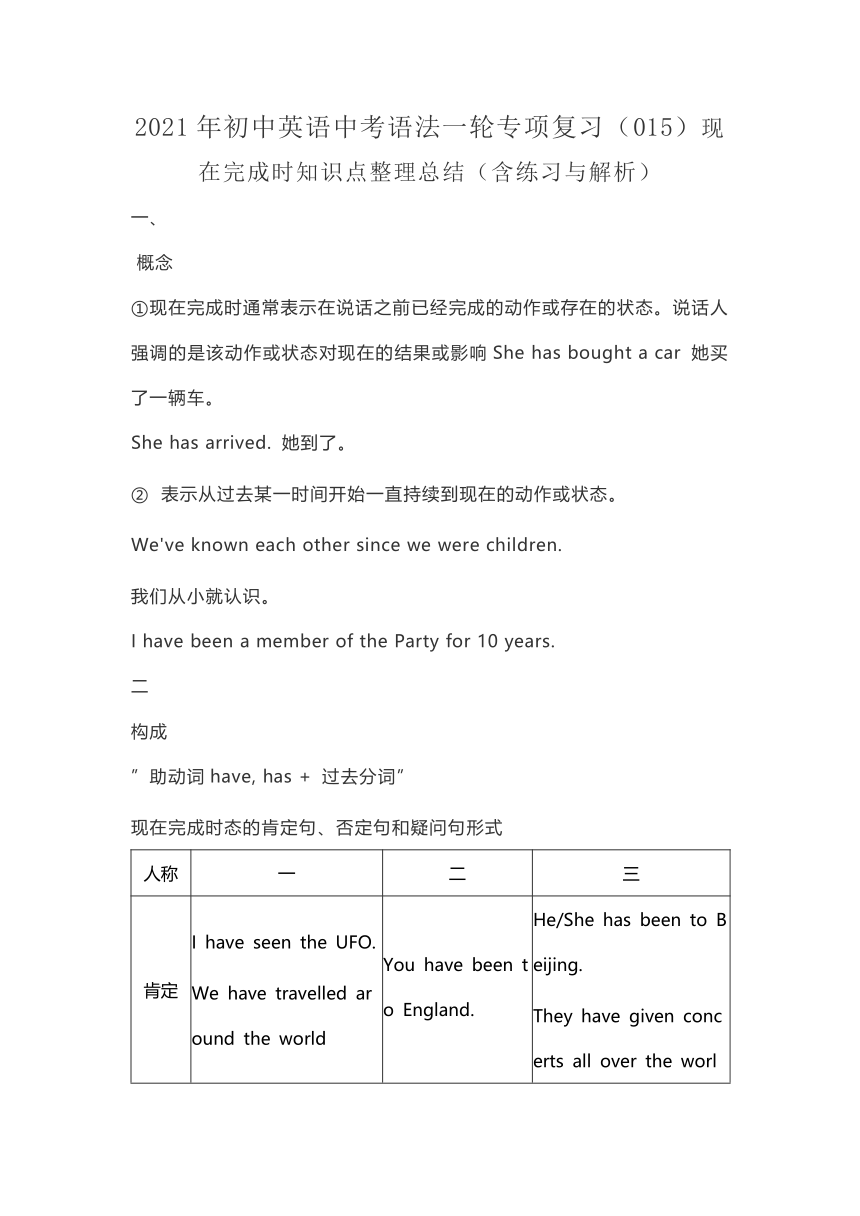 | |
| 格式 | docx | ||
| 文件大小 | 22.3KB | ||
| 资源类型 | 教案 | ||
| 版本资源 | 人教新目标(Go for it)版 | ||
| 科目 | 英语 | ||
| 更新时间 | 2020-12-10 12:02:25 | ||
图片预览

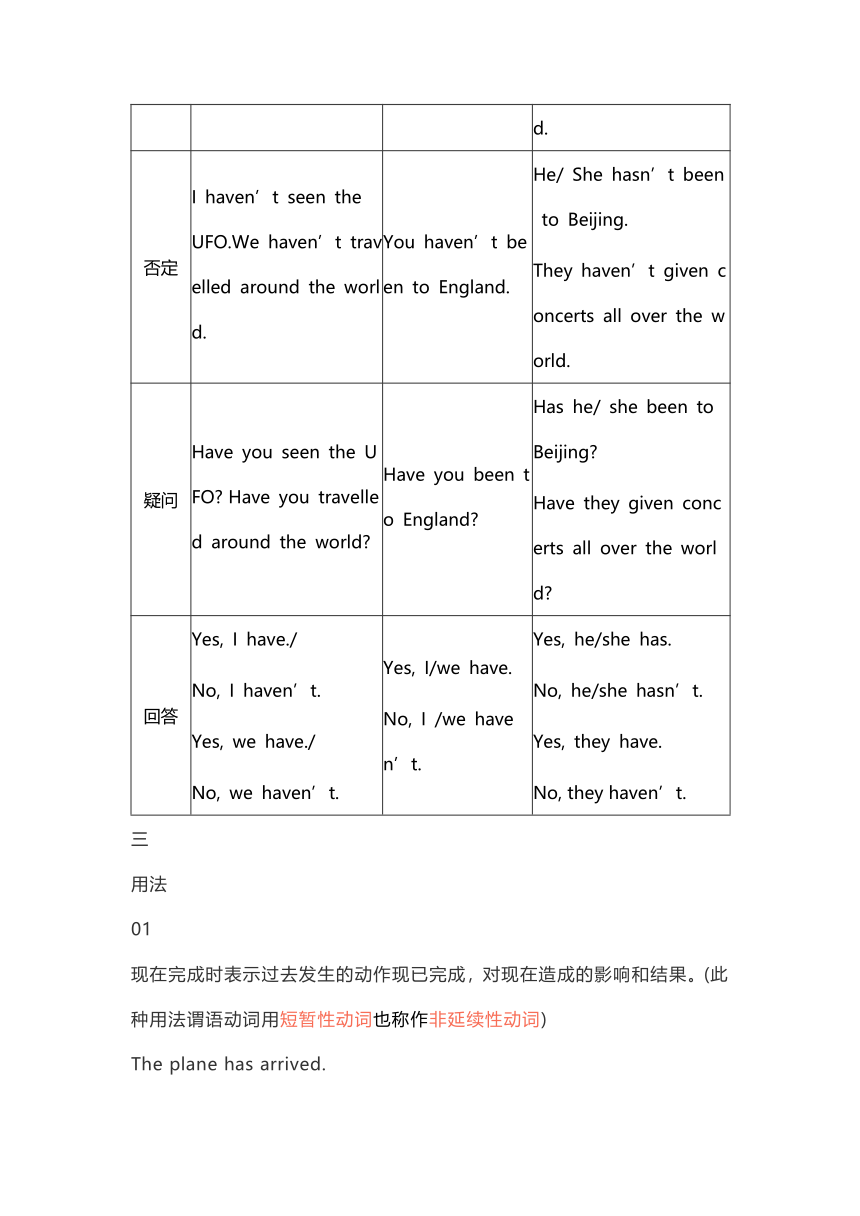
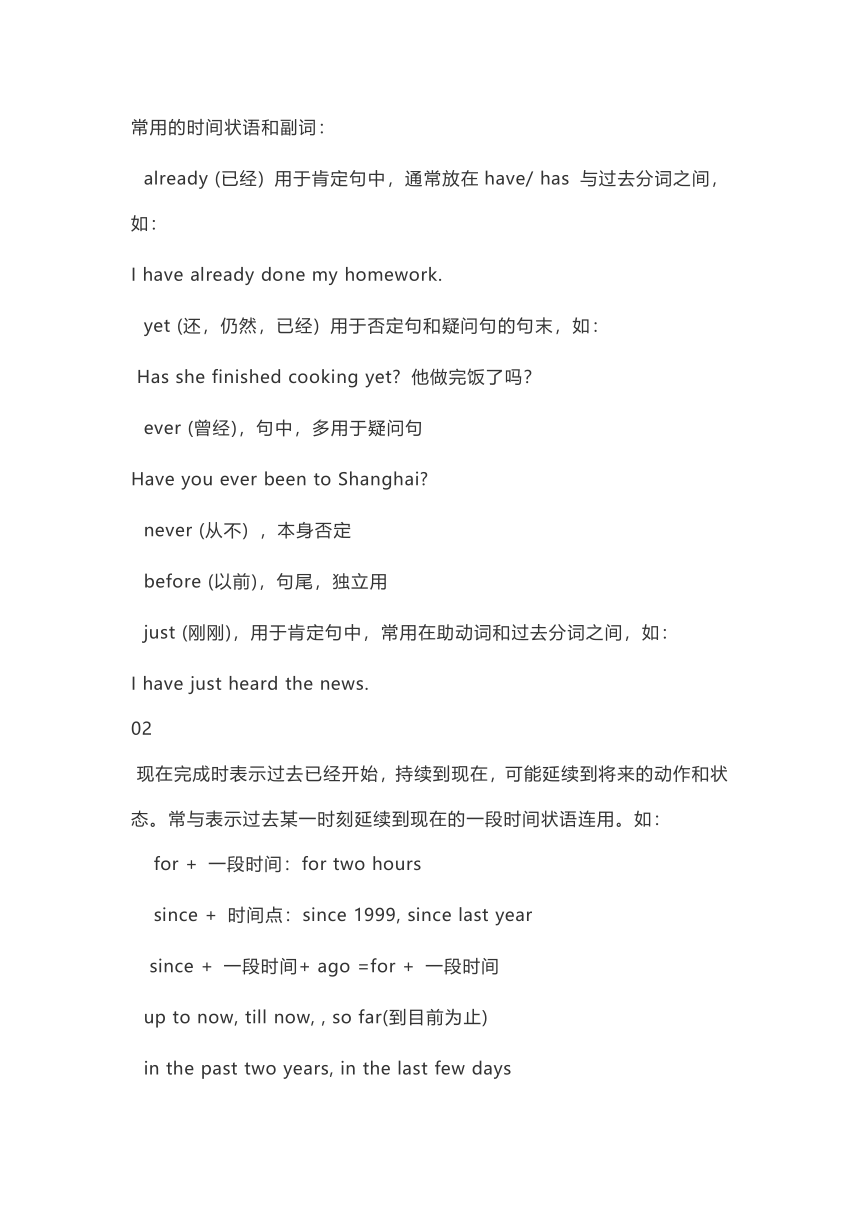
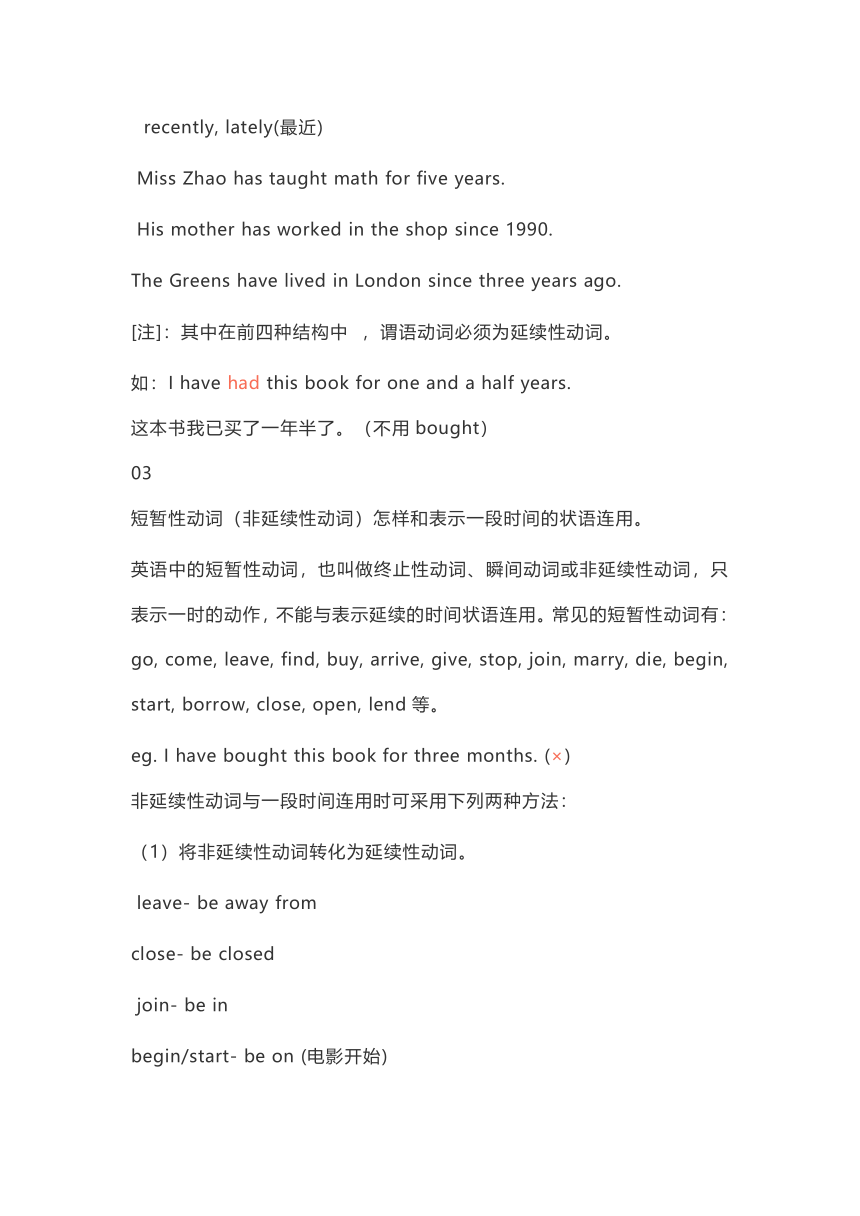
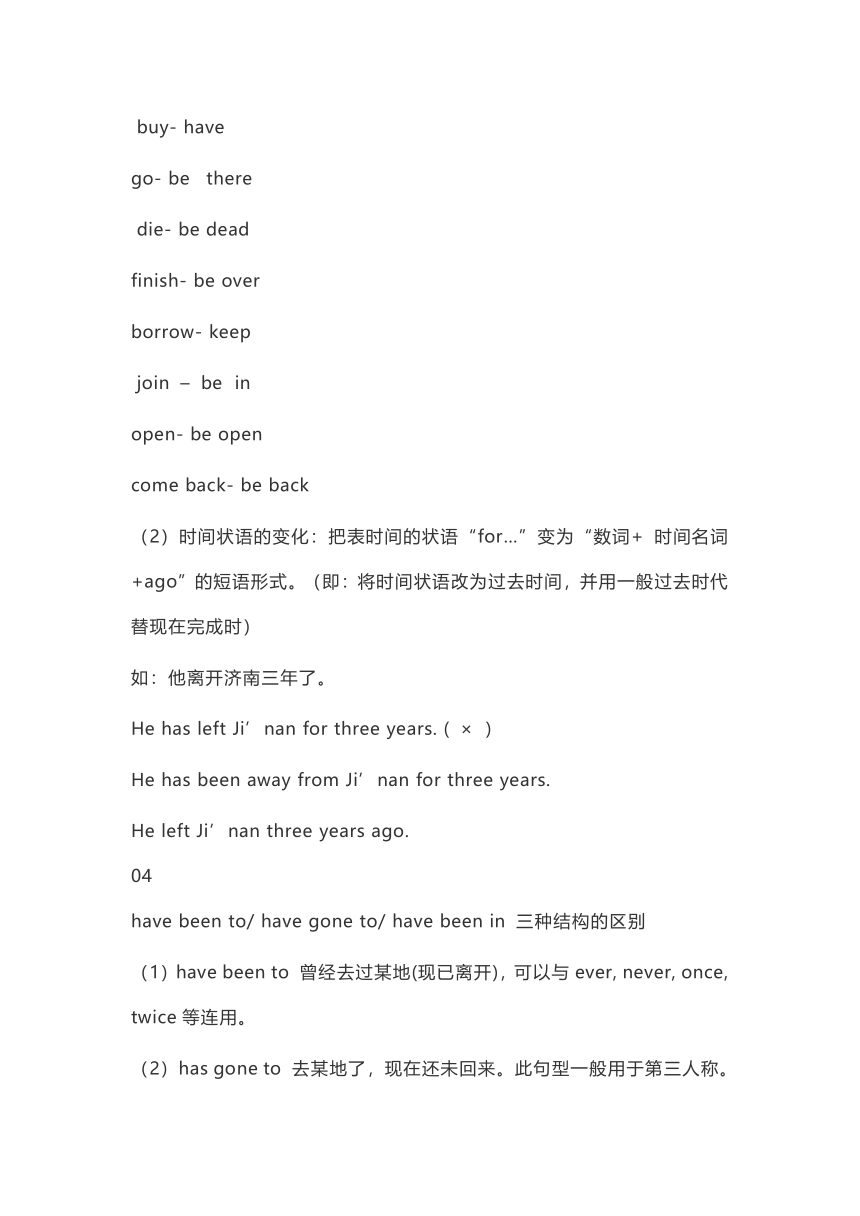
文档简介
11925300110109002021年初中英语中考语法一轮专项复习(015)现在完成时知识点整理总结(含练习与解析)
一、
?概念
①现在完成时通常表示在说话之前已经完成的动作或存在的状态。说话人强调的是该动作或状态对现在的结果或影响She has bought a car 她买了一辆车。
She has arrived. 她到了。
②??表示从过去某一时间开始一直持续到现在的动作或状态。
We've known each other since we were children.?
我们从小就认识。?
I have been a member of the Party for 10 years.
二
构成
”助动词have, has + 过去分词”
现在完成时态的肯定句、否定句和疑问句形式
人称
一
二
三
肯定
I have seen the UFO.
We have travelled around the world
You have been to England.? ?? ?
He/She has been to Beijing.
They have given concerts all over the world.
否定
I haven’t seen the UFO.We haven’t travelled around the world.
You haven’t been to England.
He/ She hasn’t been to Beijing.?
They haven’t given concerts all over the world.? ??
疑问
Have you seen the UFO??Have you travelled around the world?
Have you been to England?? ?
Has he/ she been to Beijing??
Have they given concerts all over the world?? ?
回答
Yes, I have./
No, I haven’t.?
Yes, we have./?
No, we haven’t.
Yes, I/we have.?
No, I /we haven’t.
Yes, he/she has.
No, he/she hasn’t.?
Yes, they have.
No,?they?haven’t.
三
用法
01
现在完成时表示过去发生的动作现已完成,对现在造成的影响和结果。(此种用法谓语动词用短暂性动词也称作非延续性动词)
The plane has arrived.
常用的时间状语和副词:
????already (已经) 用于肯定句中,通常放在have/ has 与过去分词之间,如:
I have already done my homework.
????yet (还,仍然,已经) 用于否定句和疑问句的句末,如:
?Has she finished cooking yet? 他做完饭了吗?
????ever (曾经),句中,多用于疑问句
Have you ever been to Shanghai?
????never (从不) ,本身否定
????before (以前),句尾,独立用
????just (刚刚),用于肯定句中,常用在助动词和过去分词之间,如:
I have just heard the news.?
02
?现在完成时表示过去已经开始,持续到现在,可能延续到将来的动作和状态。常与表示过去某一时刻延续到现在的一段时间状语连用。如:
???? for + 一段时间:for two hours
???? since + 时间点:since 1999, since last year
?????since + 一段时间+ ago =for + 一段时间
????up to now, till now, , so far(到目前为止)
????in the past two years, in the last few days
????recently, lately(最近)
?Miss Zhao has taught?math for five years.
?His mother has worked?in the shop since 1990.
The Greens have lived?in London since three years ago.
[注]:其中在前四种结构中????,谓语动词必须为延续性动词。
如:I have?had?this book for one and a half years.?
这本书我已买了一年半了。(不用bought)
03
短暂性动词(非延续性动词)怎样和表示一段时间的状语连用。
英语中的短暂性动词,也叫做终止性动词、瞬间动词或非延续性动词,只表示一时的动作,不能与表示延续的时间状语连用。常见的短暂性动词有:go, come, leave, find, buy, arrive, give, stop, join, marry, die, begin, start, borrow, close, open, lend等。
eg. I have bought this book for three months. (×)
非延续性动词与一段时间连用时可采用下列两种方法:
(1)将非延续性动词转化为延续性动词。
?leave- be away from ? ??
close- be closed
?join- be in ? ??
begin/start- be on (电影开始)
?buy- have ? ? ??
go- be ?there
?die- be?dead ? ? ??
finish- be over
borrow- keep ???????????????
?join – be??in
open- be open????????
come back- be?back???
(2)时间状语的变化:把表时间的状语“for…”变为“数词+ 时间名词+ago”的短语形式。(即:将时间状语改为过去时间,并用一般过去时代替现在完成时)
如:他离开济南三年了。
He has left Ji’nan for three years. ( ×??)
He has been away from Ji’nan for three years.
He left Ji’nan three years ago.
04
have been to/ have gone to/ have been in 三种结构的区别
(1)have been to 曾经去过某地(现已离开),可以与ever, never, once, twice等连用。
(2)has gone to 去某地了,现在还未回来。此句型一般用于第三人称。
(3) have been in 表示已在某地呆了多久,若该地为小地方则用at。句末常有for + 一段时间?或since + 时间点
05
现在完成时与一般过去时的区别:
(1) 侧重点不同:现在完成时是与现在有关的时态,属现在时态范畴,它侧重于过去的动作对现在造成的影响。而一般过去时是一种过去时态,侧重于表示过去的动作,与现在无关。如:
?Yesterday I went to the zoo.?
(仅说明昨天去了动物园,与现在无关)
?Li Lei has read the book.?
(说明李磊了解那本书的内容)
(2)连用的时间状语不同:一般过去时常与ago, yesterday, last…, in 2000, just now等连用。而现在完成时与already, yet, still, just, so far, in the last/ past…, before, ever, never, since…, for…等时间状语连用。
[注] 现在完成时不可与yesterday, last week, two days ago等过去时间状语连用。
四
现在完成时专练
Ⅰ.填空
A)用for或since填空。
1. He has lived in Nanjing_______ the year before last.
2.I've known him_______ we were children.
3.Our teacher has studied Japanese_______ three years.
4.She has been away from the city_______ about ten years.
5.It's about ten years_______ she left the city.
B)用already、yet和just填空。
6.—Have they taken down the old pictures_______ ??
—No,they haven't_______ ?.
7.Most of us have finished our compositions_______ .
8.He said he hadn't visited the exhibitions_______ .
9.Mary has_______ finished her homework, but she hasn't made her bed ????.
10.—Peter, have you finished your homework?
—Yes, Miss Lin. I've_______ finished it.
Ⅱ.单项选择
11. Diana can't go to the farm with her classmates because she_______ a bad cold.
A.will catch ????
B.is catching
C.has caught ???
D.is caught
12.The novel which I_______ ?three times is Harry Potter. Do you like it?
A.read
B.have read
C.am reading
D.were reading
13.The spaceship_______?back some pictures since it reached Mars.
A.sends
B.has sent ?????
C.have sent
D. sent
14.Melting ice (融冰) can cause sea levels to rise. Since 1993, sea levels_______?at a speed of 3.2 cm every 10 years.
A.rose
B.have risen
C.rise
15.Our music teacher_______in the school for 22 years in my hometown and he_______here when he was 23 years old.
A.taught;comes ??????????????????????
B.taught;came
C.has taught;came ?????????????????
D.has taught;comes
16.The film Operation Red Sea_______a lot of praise since its first show months ago.
A.wins
B.win
C.will win
D.has won
17.—It's time to work now.
—OK. I'll wake Carl up. He_______for an hour.
A.has fallen asleep
B.has been asleep ???
C.fell asleep
D.falls asleep
18.—When will your sister go to England?
—She_______??London since four months ago.
A.went to
B.has gone to ?????
C.has been to
D.has been in
19.—Chen Jie, I remember you_______several months ago.
—You are right. I ______for six months.
A.married;married
B.married;have married
C.married;have been married
D.have been married;have married
20.—High-speed trains, Mobile payment, Sharing bikes and Online shopping are called “four new great inventions” of modern China.
—They_______our daily lives more convenient.
A.have made
B.had made
C.have been made
D.made
III 句型转换
?21. His uncle has already posted the photos to him. (改为否定句)
His uncle ______ posted the photos to him ______.
22-Ann has gone to Shanghai.
? ? -So ______her parents. ?(完成句子)
23. Susan has been in this city for more than ten years.(改为同义句)
___more than ten years __Susan ___to this city.
24.?He has learned English for 5 years. (就划线部分提问)
? ? ? ?learned English?
25.?. The old man died?last year. ?(同义句转换)???????
The old man _____ ___ ____ for a year.
?
?
1.since 2.since 3.for 4.for 5.since
6.yet;yet 7.already 8.yet
9.already;yet 10.just/already.
11--15CBBBC ?16--20DBDCA
21hasn't, yet??22.have??
23.It’s ?since ?moved ?
24. How long has he ?
25. has been dead
?
11句意:黛安娜不能和同学们去农场了,因为她患了重感冒。患重感冒发生在过去,对现在造成的影响是“不能和同学们去农场”,故本句应用现在完成时态。
12句意:我已经读过三次的小说就是《哈利·波特》。你喜欢它吗?由句中的three times可知是已经看过,对现在造成了一定的影响,故用现在完成时态。
13.句意:这艘宇宙飞船自从到达火星以来已经发送回来一些照片了。根据句中的since it reached Mars可知要用现在完成时态。故答案选B。
14.句意:融化的冰会导致海平面上升。自1993年以来,海平面以每10年3.2厘米的速度上升。根据时间状语Since 1993可知谓语动词用现在完成时。
15.第一空指到现在已经22年,因此用完成时态;第二空有确切的表过去的时间状语,因此用一般过去时。
16.句意:电影《红海行动》自从几个月前的首映以来,已经获得了很多好评。根据后面的时间状语since its first show months ago可知此处要用现在完成时,故选D。
17.句意:——现在到工作的时间了。——好的,我把卡尔叫醒。他已经睡了一个小时了。句中for an hour是指一段时间,应用延续性动词,且“for+一段时间”是现在完成时的标志。故选B。
18.句意:——你姐姐什么时候去英国?——她四个月前就在伦敦了。根据since four months ago可知应用现在完成时,排除A;have gone to去了某地;have been to去过某地;have been in待在某地(常和一段时间连用)。根据句意可知选D。
19.句意:——陈婕,我记得你几个月前结婚了。——是的,我已经结婚六个月了。根据时间状语“several months ago”可知第一空要用一般过去时;“for six months”提示第二空用现在完成时,并且要用表示状态的be married。故选C。
20.句意:——高速铁路、移动支付、共享单车和网上购物被称作现代中国的“新四大发明”。——它们使我们的日常生活更加便利。根据句意可知此处表示过去的动作对现在造成的影响,故用现在完成时态。
一、
?概念
①现在完成时通常表示在说话之前已经完成的动作或存在的状态。说话人强调的是该动作或状态对现在的结果或影响She has bought a car 她买了一辆车。
She has arrived. 她到了。
②??表示从过去某一时间开始一直持续到现在的动作或状态。
We've known each other since we were children.?
我们从小就认识。?
I have been a member of the Party for 10 years.
二
构成
”助动词have, has + 过去分词”
现在完成时态的肯定句、否定句和疑问句形式
人称
一
二
三
肯定
I have seen the UFO.
We have travelled around the world
You have been to England.? ?? ?
He/She has been to Beijing.
They have given concerts all over the world.
否定
I haven’t seen the UFO.We haven’t travelled around the world.
You haven’t been to England.
He/ She hasn’t been to Beijing.?
They haven’t given concerts all over the world.? ??
疑问
Have you seen the UFO??Have you travelled around the world?
Have you been to England?? ?
Has he/ she been to Beijing??
Have they given concerts all over the world?? ?
回答
Yes, I have./
No, I haven’t.?
Yes, we have./?
No, we haven’t.
Yes, I/we have.?
No, I /we haven’t.
Yes, he/she has.
No, he/she hasn’t.?
Yes, they have.
No,?they?haven’t.
三
用法
01
现在完成时表示过去发生的动作现已完成,对现在造成的影响和结果。(此种用法谓语动词用短暂性动词也称作非延续性动词)
The plane has arrived.
常用的时间状语和副词:
????already (已经) 用于肯定句中,通常放在have/ has 与过去分词之间,如:
I have already done my homework.
????yet (还,仍然,已经) 用于否定句和疑问句的句末,如:
?Has she finished cooking yet? 他做完饭了吗?
????ever (曾经),句中,多用于疑问句
Have you ever been to Shanghai?
????never (从不) ,本身否定
????before (以前),句尾,独立用
????just (刚刚),用于肯定句中,常用在助动词和过去分词之间,如:
I have just heard the news.?
02
?现在完成时表示过去已经开始,持续到现在,可能延续到将来的动作和状态。常与表示过去某一时刻延续到现在的一段时间状语连用。如:
???? for + 一段时间:for two hours
???? since + 时间点:since 1999, since last year
?????since + 一段时间+ ago =for + 一段时间
????up to now, till now, , so far(到目前为止)
????in the past two years, in the last few days
????recently, lately(最近)
?Miss Zhao has taught?math for five years.
?His mother has worked?in the shop since 1990.
The Greens have lived?in London since three years ago.
[注]:其中在前四种结构中????,谓语动词必须为延续性动词。
如:I have?had?this book for one and a half years.?
这本书我已买了一年半了。(不用bought)
03
短暂性动词(非延续性动词)怎样和表示一段时间的状语连用。
英语中的短暂性动词,也叫做终止性动词、瞬间动词或非延续性动词,只表示一时的动作,不能与表示延续的时间状语连用。常见的短暂性动词有:go, come, leave, find, buy, arrive, give, stop, join, marry, die, begin, start, borrow, close, open, lend等。
eg. I have bought this book for three months. (×)
非延续性动词与一段时间连用时可采用下列两种方法:
(1)将非延续性动词转化为延续性动词。
?leave- be away from ? ??
close- be closed
?join- be in ? ??
begin/start- be on (电影开始)
?buy- have ? ? ??
go- be ?there
?die- be?dead ? ? ??
finish- be over
borrow- keep ???????????????
?join – be??in
open- be open????????
come back- be?back???
(2)时间状语的变化:把表时间的状语“for…”变为“数词+ 时间名词+ago”的短语形式。(即:将时间状语改为过去时间,并用一般过去时代替现在完成时)
如:他离开济南三年了。
He has left Ji’nan for three years. ( ×??)
He has been away from Ji’nan for three years.
He left Ji’nan three years ago.
04
have been to/ have gone to/ have been in 三种结构的区别
(1)have been to 曾经去过某地(现已离开),可以与ever, never, once, twice等连用。
(2)has gone to 去某地了,现在还未回来。此句型一般用于第三人称。
(3) have been in 表示已在某地呆了多久,若该地为小地方则用at。句末常有for + 一段时间?或since + 时间点
05
现在完成时与一般过去时的区别:
(1) 侧重点不同:现在完成时是与现在有关的时态,属现在时态范畴,它侧重于过去的动作对现在造成的影响。而一般过去时是一种过去时态,侧重于表示过去的动作,与现在无关。如:
?Yesterday I went to the zoo.?
(仅说明昨天去了动物园,与现在无关)
?Li Lei has read the book.?
(说明李磊了解那本书的内容)
(2)连用的时间状语不同:一般过去时常与ago, yesterday, last…, in 2000, just now等连用。而现在完成时与already, yet, still, just, so far, in the last/ past…, before, ever, never, since…, for…等时间状语连用。
[注] 现在完成时不可与yesterday, last week, two days ago等过去时间状语连用。
四
现在完成时专练
Ⅰ.填空
A)用for或since填空。
1. He has lived in Nanjing_______ the year before last.
2.I've known him_______ we were children.
3.Our teacher has studied Japanese_______ three years.
4.She has been away from the city_______ about ten years.
5.It's about ten years_______ she left the city.
B)用already、yet和just填空。
6.—Have they taken down the old pictures_______ ??
—No,they haven't_______ ?.
7.Most of us have finished our compositions_______ .
8.He said he hadn't visited the exhibitions_______ .
9.Mary has_______ finished her homework, but she hasn't made her bed ????.
10.—Peter, have you finished your homework?
—Yes, Miss Lin. I've_______ finished it.
Ⅱ.单项选择
11. Diana can't go to the farm with her classmates because she_______ a bad cold.
A.will catch ????
B.is catching
C.has caught ???
D.is caught
12.The novel which I_______ ?three times is Harry Potter. Do you like it?
A.read
B.have read
C.am reading
D.were reading
13.The spaceship_______?back some pictures since it reached Mars.
A.sends
B.has sent ?????
C.have sent
D. sent
14.Melting ice (融冰) can cause sea levels to rise. Since 1993, sea levels_______?at a speed of 3.2 cm every 10 years.
A.rose
B.have risen
C.rise
15.Our music teacher_______in the school for 22 years in my hometown and he_______here when he was 23 years old.
A.taught;comes ??????????????????????
B.taught;came
C.has taught;came ?????????????????
D.has taught;comes
16.The film Operation Red Sea_______a lot of praise since its first show months ago.
A.wins
B.win
C.will win
D.has won
17.—It's time to work now.
—OK. I'll wake Carl up. He_______for an hour.
A.has fallen asleep
B.has been asleep ???
C.fell asleep
D.falls asleep
18.—When will your sister go to England?
—She_______??London since four months ago.
A.went to
B.has gone to ?????
C.has been to
D.has been in
19.—Chen Jie, I remember you_______several months ago.
—You are right. I ______for six months.
A.married;married
B.married;have married
C.married;have been married
D.have been married;have married
20.—High-speed trains, Mobile payment, Sharing bikes and Online shopping are called “four new great inventions” of modern China.
—They_______our daily lives more convenient.
A.have made
B.had made
C.have been made
D.made
III 句型转换
?21. His uncle has already posted the photos to him. (改为否定句)
His uncle ______ posted the photos to him ______.
22-Ann has gone to Shanghai.
? ? -So ______her parents. ?(完成句子)
23. Susan has been in this city for more than ten years.(改为同义句)
___more than ten years __Susan ___to this city.
24.?He has learned English for 5 years. (就划线部分提问)
? ? ? ?learned English?
25.?. The old man died?last year. ?(同义句转换)???????
The old man _____ ___ ____ for a year.
?
?
1.since 2.since 3.for 4.for 5.since
6.yet;yet 7.already 8.yet
9.already;yet 10.just/already.
11--15CBBBC ?16--20DBDCA
21hasn't, yet??22.have??
23.It’s ?since ?moved ?
24. How long has he ?
25. has been dead
?
11句意:黛安娜不能和同学们去农场了,因为她患了重感冒。患重感冒发生在过去,对现在造成的影响是“不能和同学们去农场”,故本句应用现在完成时态。
12句意:我已经读过三次的小说就是《哈利·波特》。你喜欢它吗?由句中的three times可知是已经看过,对现在造成了一定的影响,故用现在完成时态。
13.句意:这艘宇宙飞船自从到达火星以来已经发送回来一些照片了。根据句中的since it reached Mars可知要用现在完成时态。故答案选B。
14.句意:融化的冰会导致海平面上升。自1993年以来,海平面以每10年3.2厘米的速度上升。根据时间状语Since 1993可知谓语动词用现在完成时。
15.第一空指到现在已经22年,因此用完成时态;第二空有确切的表过去的时间状语,因此用一般过去时。
16.句意:电影《红海行动》自从几个月前的首映以来,已经获得了很多好评。根据后面的时间状语since its first show months ago可知此处要用现在完成时,故选D。
17.句意:——现在到工作的时间了。——好的,我把卡尔叫醒。他已经睡了一个小时了。句中for an hour是指一段时间,应用延续性动词,且“for+一段时间”是现在完成时的标志。故选B。
18.句意:——你姐姐什么时候去英国?——她四个月前就在伦敦了。根据since four months ago可知应用现在完成时,排除A;have gone to去了某地;have been to去过某地;have been in待在某地(常和一段时间连用)。根据句意可知选D。
19.句意:——陈婕,我记得你几个月前结婚了。——是的,我已经结婚六个月了。根据时间状语“several months ago”可知第一空要用一般过去时;“for six months”提示第二空用现在完成时,并且要用表示状态的be married。故选C。
20.句意:——高速铁路、移动支付、共享单车和网上购物被称作现代中国的“新四大发明”。——它们使我们的日常生活更加便利。根据句意可知此处表示过去的动作对现在造成的影响,故用现在完成时态。
同课章节目录
- 词法
- 名词
- 动词和动词短语
- 动词语态
- 动词时态
- 助动词和情态动词
- 非谓语动词
- 冠词
- 代词
- 数词和量词
- 形容词副词及其比较等级
- 介词和介词短语
- 连词和感叹词
- 构词法
- 相似、相近词比较
- 句法
- 陈述句
- 一般疑问句和否定疑问句
- 特殊疑问句及选择疑问句
- 反意疑问句
- 存在句(There be句型)
- 宾语从句
- 定语从句
- 状语从句
- 主谓一致问题
- 简单句
- 并列句
- 复合句
- 主谓一致
- 主、表语从句
- 名词性从句
- 直接引语和间接引语
- 虚拟语气
- 感叹句
- 强调句
- 倒装句
- 祈使句
- 句子的成分
- 句子的分类
- 题型专区
- 单项选择部分
- 易错题
- 完形填空
- 阅读理解
- 词汇练习
- 听说训练
- 句型转换
- 补全对话
- 短文改错
- 翻译
- 书面表达
- 任务型阅读
- 语法填空
- 其他资料
